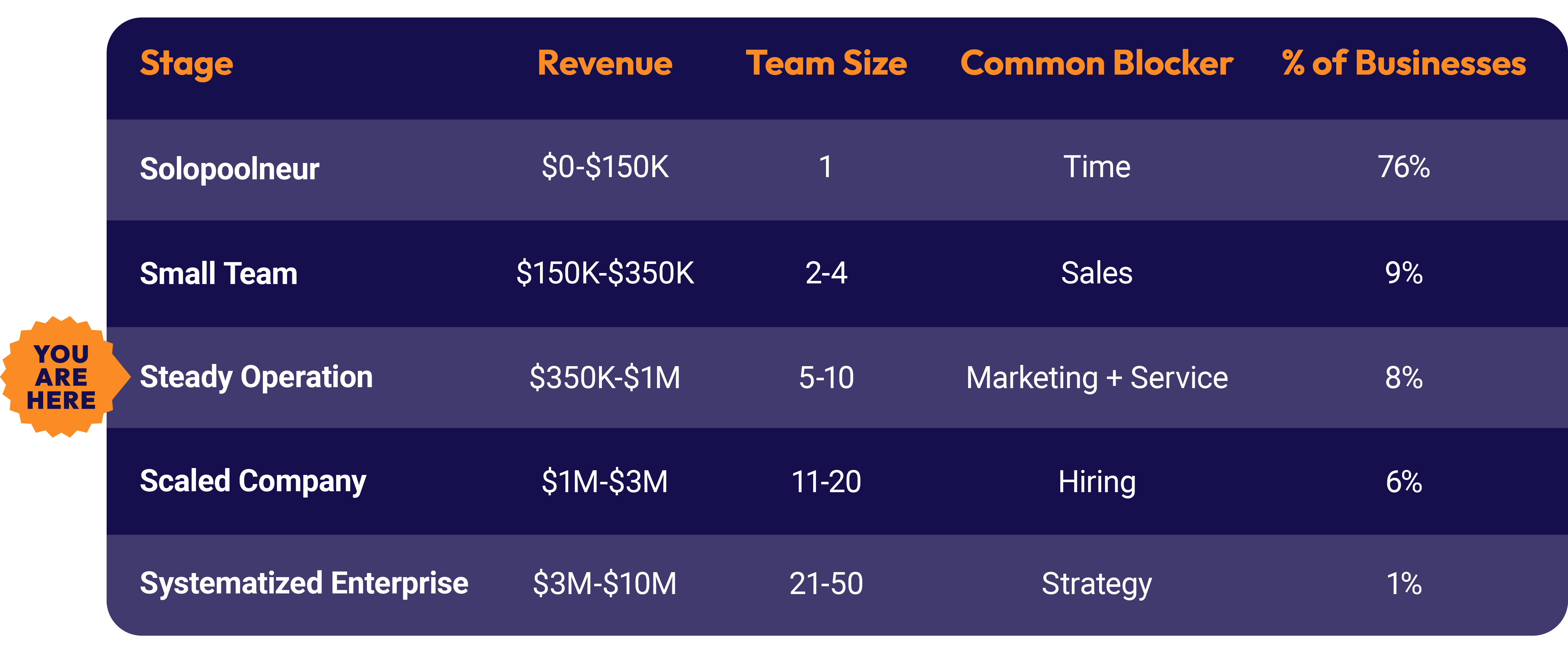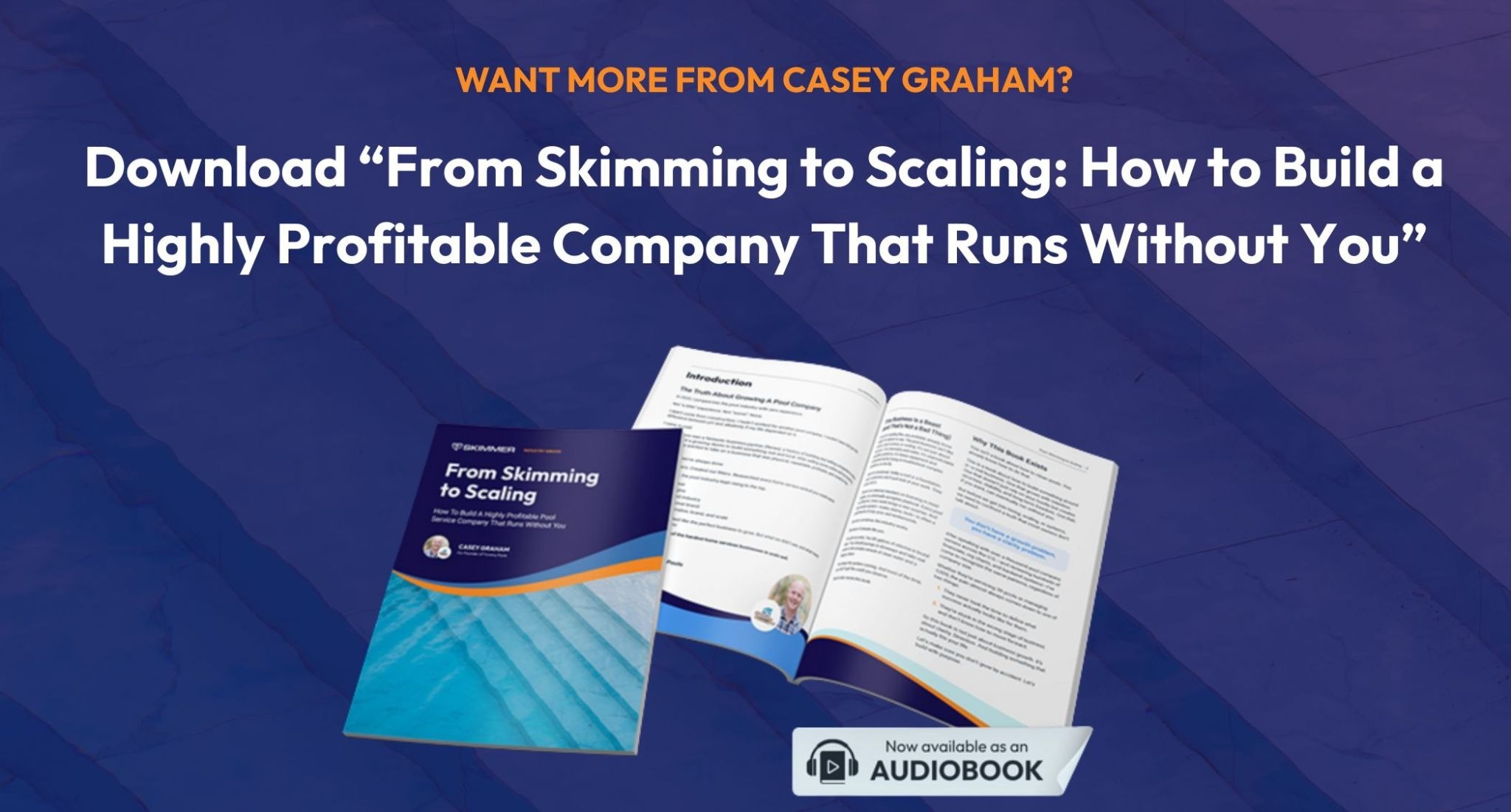
From Driver to Delegator: How to Build a Team of Leaders
Once your pool business reaches the Steady Operation stage, the next challenge is learning to lead through others. This article explains how to shift from managing every decision to developing leaders who can run the business without you. Discover how to hire for leadership, not loyalty; build field and office teams that own results; and avoid common pitfalls like promoting strong performers who aren’t ready to manage. You’ll also learn how to invest in your own growth as a business leader and use newfound freedom to refine strategy and build a lasting legacy.
Other pieces in this series
- Solopoolneurs and the leadership leap that changes everything
- Three drivers that fuel real growth in the Small Team stage
- How to choose the future of your pool business
- Designing a Systematized Enterprise for ultimate pool company growth
There are many stops you have to hit on your way to becoming the owner of a fully-scaled pool service business.
Once you’ve broken through the Solopoolneur stage and driven your business out of the Small Team stage, you’ll be firmly in the Steady Operation Stage.
This is a great place to be for many reasons. You’re no longer doing everything yourself, and you’re not as deeply involved in service and operations as you were in the Small Team stage.
But it also comes with its own set of traps.
Because while you’re no longer responsible for everything day-to-day, you’re still the engine that makes everything run. You’ve got people helping you out, but you’re still the main decision-maker.
If you want to grow past this point, you have to make one of the hardest shifts any pool business owner can make: You have to stop leading doers and start leading leaders. In other words, you have to start letting other people own outcomes.
It’s tough, but it’s not impossible. Let’s break it down.

Hire for outcomes, not just tasks
If you want to become a true Delegator, you’ll need to hire leaders for two core functions:
- Field service: A field ops manager can manage techs, repairs, and route performance.
- Office/admin: An office leader can oversee invoicing, customer communications, and scheduling.
Most owners try to promote their most loyal team members into these roles. They figure, “She’s been with me since the beginning, and she’s great in the field. I’ll just make her the field manager.”
This rarely works. That loyal tech may be great at service, but that doesn’t mean she knows how to lead a team, coach underperformers, track KPIs, or hold weekly meetings. That’s a different skill set—and this is where most businesses stall.
You don’t need loyalty. You need leadership.
Often, this means hiring from outside the industry. I’ve seen owners find great field managers from FedEx, logistics companies, and even warehouse supervisors—people who know how to lead crews, manage systems, and drive performance.
At Yummy Pools, we worked with a pool company that brought in a former HVAC dispatcher as their service manager. She knew nothing about pools, but she knew how to build schedules, track tech performance, run morning huddles, and make customers feel heard.
Within 90 days, she had created:
- A color-coded whiteboard for tech accountability
- A simple dashboard to flag repeat customer issues
- A feedback loop between field service and office staff
Knowing how to lead people is what matters most at this stage. Yes, it costs more. But the right leader pays for themselves in time, efficiency, customer retention, and employee development.
Focus your leadership where it counts
At this stage, I recommend owners stay directly involved in marketing and sales, at least for now. Why?
- It’s the most easily leveraged function for growth
- It’s where most owners have natural skill or vision
- Focusing here ensures you keep driving new business while your team manages fulfillment
With you running sales and marketing—and your office and field leaders running their respective functions—you can scale your business well beyond $1M in recurring revenue without things falling apart when you take a vacation.
Watch out for the Peter Principle
Over time, you’ll get to a point where your best techs should be promoted. That’s great, and hard work should be recognized. But watch out for the Peter Principle, which posits that people are promoted to their level of incompetence. In pool companies, this often shows up when:
- A loyal tech becomes a manager, but can’t lead.
- A solid admin becomes the office manager, but can’t handle stress.
- A friendly helper becomes a crew lead, but can’t correct poor performance.
Before you promote someone to a leadership role, ask yourself:
- Has this person led a team before?
- Can they handle difficult conversations?
- Do they understand metrics and accountability?
- Are they motivated to grow others — not just themselves?
These are qualities and skill sets you can build into your training. You want your best employees to be set up for success, so do everything you can to make sure they’re not on an island when and if you promote them.
Focus on becoming a business leader
Your employees need to be coached and trained to advance to the next level of their careers. So do you.
You’ve spent years mastering chemistry and circulation systems. Now it’s time to master communication, strategy, and systems thinking. In other words, you need to focus on personal development to be the best business leader possible.
There are a few things you can do to start investing in leadership growth:
- Join a local mastermind or coaching group
- Read business and leadership books (start with Five Dysfunctions of a Team)
- Attend events outside the pool industry so you can learn from experienced leaders in other sectors.
Remember, your business can only grow as much as you do.
“Free time” is a double-edged sword
One of the best parts of this stage is that, when you hire the right leaders, the chaos calms down. The upside of this is that you can take a vacation without the business collapsing. The downside is that you might start coasting.
Owners who don’t fill their freed-up time with meaningful work often backslide, causing growth to stall.
Here’s what to do with your reclaimed time:
- Meet weekly with your leadership team to coach and problem-solve
- Refine your sales process and review closing rates
- Audit and revisit your pricing strategy
- Refine your training program for new techs
- Evaluate your org chart and plan for the next hire
All of this is the work of a real business builder.
Final thought: When you give up control, you make it possible to build a legacy
Ultimately, the Delegator Stage is about getting the right people to run your daily operations better than you ever could. In that shift, you move from being an essential part of the business to an effective leader of the business.
It means letting go of control, but it also means enabling real growth. And you might just end up with a legacy.
About the creators
At Skimmer, we believe pool service professionals deserve better tools, stronger support, and better business outcomes. That’s why we built the leading software platform for pool and spa service companies.
Today, more than 30,000 pros across North America use Skimmer to streamline routes, get paid faster, and scale their operations—all while delivering consistent, professional service. Our mission is simple: modernize the industry and empower the people who keep it running.
Casey Graham has built and grown companies across multiple industries, including Yummy Pools, which rapidly expanded in the Atlanta market before being acquired by Trivest. Now, as VP of M&A for the Yummy Pools platform, he helps other pool companies grow through acquisition and operational excellence.
We partnered on this ebook because we share a belief: success in the pool service business isn’t only about profit—it’s about purpose, consistency, and the right systems to support your goals. Whether you’re starting out or leading a growing team, we hope this guide helps you align your “why” and move forward with clarity.

TL;DR: From Driver to Delegator
To grow beyond the “Steady Operation Stage,” pool business owners must evolve from managing doers to leading leaders. The key is hiring people who can own outcomes—not just complete tasks.
- Hire for leadership, not loyalty: Field and office managers need people skills, accountability, and systems thinking. Just because a tech has been with you for years doesn’t mean they can easily step into these positions.
- Stay close to marketing and sales: It’s the most scalable lever for growth and keeps revenue steady while others handle operations.
- Avoid the Peter Principle: Don’t promote great performers into leadership unless they’ve shown they can lead, coach, and handle accountability.
- Invest in your own leadership: Learn communication, strategy, and systems. Join masterminds, read, and learn from other industries.
- Use your “free time” wisely: Once the chaos settles, focus on coaching your leaders, improving sales, pricing, and training—don’t coast.
Bottom line: True scaling happens when you empower others to lead and step fully into your role as a business builder. That’s how you create a lasting, self-sustaining company.

















